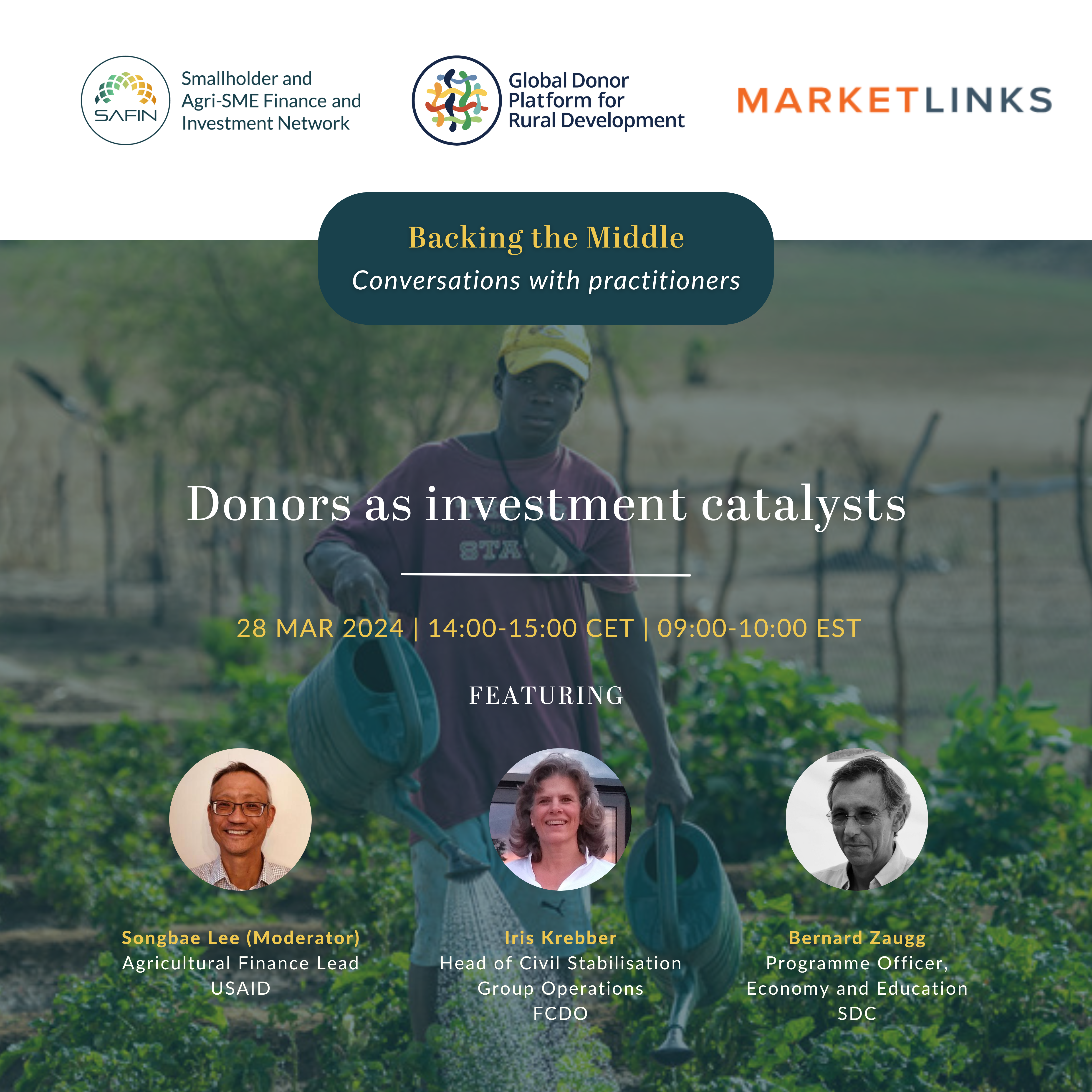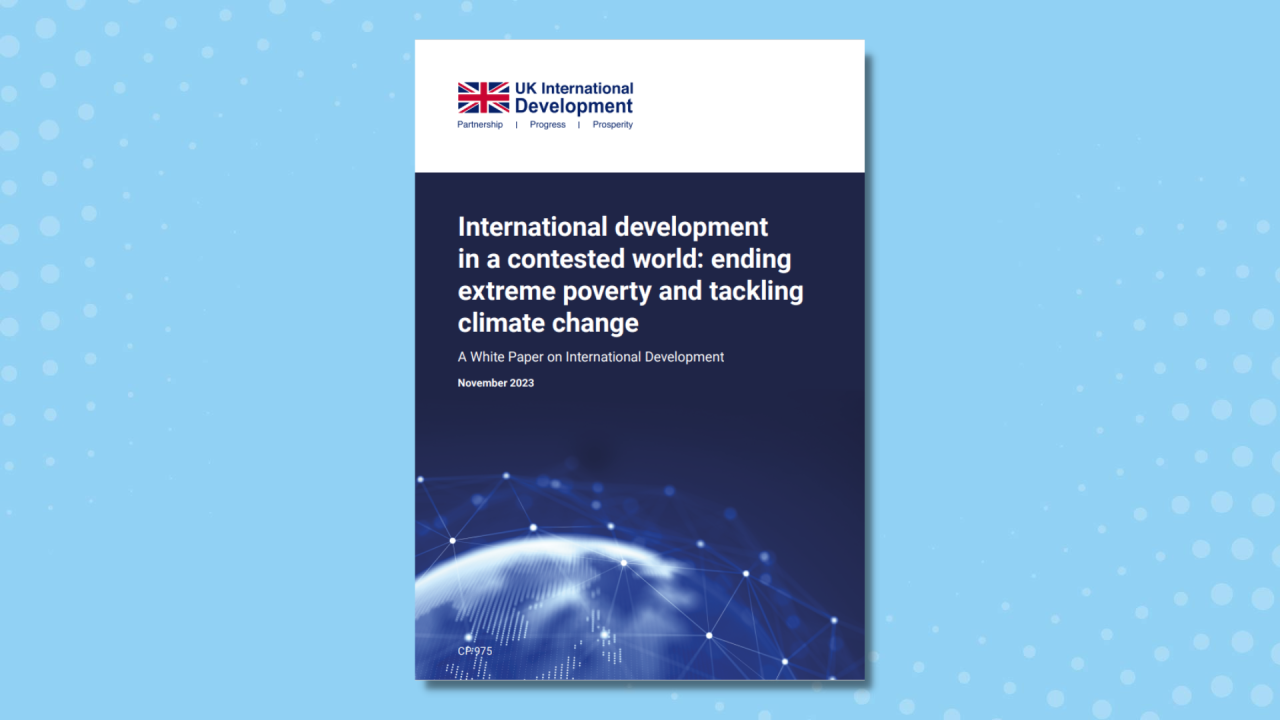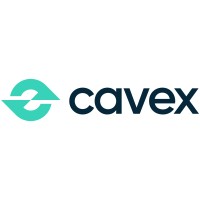Recording forthcoming
FSD Africa is also pioneering nature finance on the continent through the launch of the
African Natural Capital Alliance – as part of a strategy focused on driving investments
which deliver for both people and planet
Session two of the ‘Backing the Middle’ series. This session hosted a discussion with donors to discuss where concessional capital is best utilized in the agri-SME finance market.
With declining rates of official development assistance (ODA), donor countries have employed innovative ways to attract more investment from the private sector to agriculture, notably through blended finance instruments.
With declining rates of official development assistance (ODA), donor countries have employed innovative ways to attract more investment from the private sector to agriculture, notably through blended finance instruments.
Session two of our ‘Backing the Middle’ series hosted a discussion with donors to discuss where concessional capital is best utilized.
- Should development finance focus on investment funds, financial incentive models or technical assistance to move the needle in agri-SME finance?
- Is there a better way to use these funds for higher impact on the performance of small agricultural enterprises and the farmers they serve?
- What does the evidence from years of donor engagement in agricultural development tell us?
- Songbae Lee, Agriculture Finance Team lead, U.S. Agency for International Development (USAID) (Moderator)
- Iris Krebber, Head of Civil Stabilisation Group Operations, UK Food Security and Land, Foreign, Commonwealth & Development Office (FCDO)
- Bernard Zaugg, Programme Officer, Economy and Education, Swiss Agency for Development and Cooperation (SDC)
Shared resource:
OGL (2023) International development in a contested world: endingextreme poverty and
tacklingclimate change A White Paper on International Development November 2023, #155 p.
tacklingclimate change A White Paper on International Development November 2023, #155 p.
This White Paper sets out a re-energised international development agenda, for the
UK, working with its partners, based on the following priorities:
- going further, faster to mobilise international finance to end extreme poverty, tackle climate change and biodiversity loss, power sustainable growth and increase private sector investment in development • strengthening and reforming the international system to improve action on trade, tax, debt, tackling dirty money and corruption, and delivering on global challenges like health, climate, nature and energy transition
- harnessing innovation and new technologies, science and research for the greatest and most cost-effective development impact
- ensuring opportunities for all, putting women and girls centre stage and investing in education and health systems that societies want
- championing action to address state fragility, and anticipate and prevent conflict, humanitarian crises, climate disasters and threats to global health
- building resilience and enabling adaptation for those affected by conflict, disasters and climate change, strengthening food security, social protection, disaster risk financing and building state capability
- standing up for its values, for open inclusive societies, for women and girls, and preventing roll-back of rights
Extract: Case Study 6: Financial Sector Deepening Africa (FSD Africa)
(page 55) Established in Nairobi in 2012 by the UK, FSD Africa is a specialist development agency
working across more than 30 African countries to address challenges stopping finance getting to where it is most needed.
working across more than 30 African countries to address challenges stopping finance getting to where it is most needed.
- FSD Africa has helped mobilise £2.7 billion of capital, increased access to financial services for 12 million people and to basic services for 4.7 million. It advises on policy and regulatory reform and supports innovative transactions like green and gender bonds. In 2019, FSD Africa worked with Acorn Holdings to issue the first green bond in Kenya, to finance environmentally sustainable student housing, which co-listed in Nairobi and London.
- FSD Africa strengthens financial systems by putting in place core market infrastructure such as its ongoing work to establish a new securities exchange in Ethiopia. FSD Africa and FCDO’s research supports high-risk high-impact projects like Cavex (Carbon Value Exchange) from initial idea to scalable platform.
Cavex (Carbon Value Exchange)
Cavex has the potential to go to scale
like mobile money did 15 years ago when M-PESA spearheaded a global wave of digital
finance.
- Cavex is a highly innovative platform that utilises digital technologies to increase trust, equity, and transparency in the voluntary carbon markets. Cavex enables access to critical carbon financing for small-scale projects across the Global South, which currently struggle to participate given the high up-front cost and time required for carbon credit validation, issuance, and brokerage.
- Cavex has been incubated by 4RDigital with support from FCDO, The Shell Foundation, and FSD Africa.
- Cavex will connect companies in countries like the UK that want to offset their
carbon emissions, with the innovators and rural households in Africa that want to switch
from open fires to clean energy stoves. Embedded
chips in the stoves enable auditors to confirm the stoves are being used and the carbon saved. Mobile money platforms, such as M-PESA, can then enable tens of thousands of households to directly benefit from these carbon credits, typically worth $40 a year. - Cavex aims to channel $500m of climate finance to many organisations and individuals across Africa by 2030 and support the removal or avoidance of 100m+ tonnes of carbon offsets.
- Its mission is to catalyse nature-positive African economies, enabled by a financial sector that recognises and acts on nature-related risks and opportunities.
- Working across public and private sectors, the African Natural Capital Alliance supports approaches to policy, regulation, and investment that maximise the opportunities for sustainable growth from and for Africa’s natural capital.






No comments:
Post a Comment